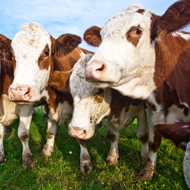Foot-and-mouth disease outbreak in Russia

Defra says the risk of FMD entering the UK remains low despite the recent case in Russia.
Defra has confirmed an outbreak of foot-and-mouth disease (FMD) in cattle in the Vladimir region of West Russia.
The virus was confirmed as FMD serotype Asia-1 on the 16 October at the OIE reference laboratory in Vladimir, but the source remains unknown.
Russia had been declared FMD free without vaccination across most of the country since 2015. This is the first outbreak of FMD in the free area since then, and there have been no other reported outbreaks of FMD Asia-1 from neighbouring countries this year.
Emergency vaccination is being carried out in a zone around the outbreak area. Over 17,600 cattle and 1,300 small ruminants have been vaccinated. All 814 cattle, 11 small ruminants and 54 swine that were susceptible to FMD were destroyed. A number of other surveillance and control measures are being applied.
Defra says the risk of FMD entering the UK remains low despite the recent case in Russia.
An outbreak assessment by Defra reads: 'Outbreaks of new strains in new areas do occur and are indicative of the highly contagious nature of the disease. Russia is not approved for legal trade with the EU for any FMD-susceptible livestock species and imports of products of animal origin should be treated or certified as originating in FMD free regions.
'We will continue to monitor the situation closely and remind all livestock keepers of the ban on swill feeding to livestock and that suspect cases of any notifiable disease, including vesicular disease should be reported to APHA.'
Asia-1 has been confirmed in samples recently submitted from northern Iran and north west Afghanistan, according to the Pirbright Institute.
Defra's assessment says recent outbreaks of other diseases - such as lumpy skin disease to the south of Vladimir region and sheep pox to the north - suggest that cattle and small ruminant trade is occurring in the area, potentially without sufficient checks on movements. It is not yet known if the source of the outbreak is movement of live animals or another cause.



 The Federation of Independent Veterinary Practices (FIVP) has announced a third season of its podcast, Practice Matters.
The Federation of Independent Veterinary Practices (FIVP) has announced a third season of its podcast, Practice Matters.